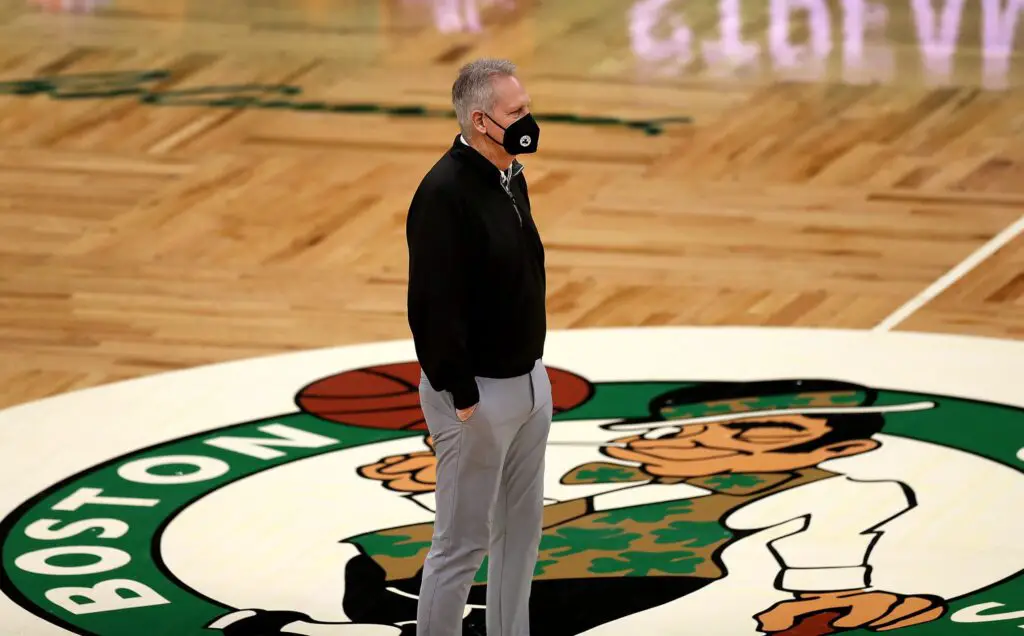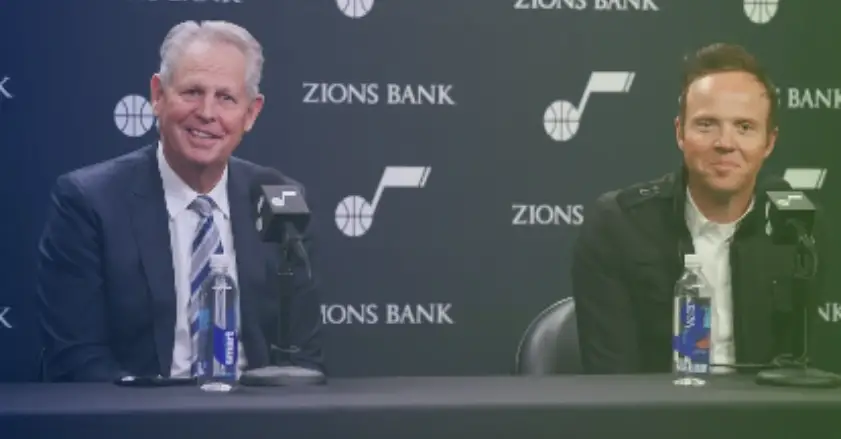On June 2nd 2021, mere hours past the Boston Celtics’ elimination from the play-offs in a gentleman’s sweep by the Brooklyn Nets, Danny Ainge stepped down from the team’s front office after 18 years of serving as GM. Rumors concerning his next stop immediately started popping up. Due to his pre-existing relationship with the Jazz’s new owner Ryan Smith (a source close to the team described them as “best friends”), many assumed that Utah would be Ainge’s preferred destination.
Well, it took a few months but they were proven right. On December 15th, the Jazz announced that Danny Ainge was hired as the team’s new CEO and Alternate Governor, adding him next to Dwyane Wade in the list of weighty NBA names decorating Utah’s front office. His addition presents an opportunity for the Jazz, but it also poses a threat. Let’s go through Ainge’s tenure with the Celtics and try to predict how it may translate with the Jazz.
Danny Ainge has never been one to shy away from big moves. He made 62 trades during his 18 seasons with the Celtics, and among them there are some of the most iconic ones in NBA history. Most notably, in the 2007 off-season, for which he won the NBA Executive of the Year award, he brought Kevin Garnett and Ray Allen to Boston, thus forming a superteam and guiding the franchise to its first ring in 22 years. 6 years later, he sent Garnett and Celtics legend Paul Pierce, along with other assets, to Brooklyn, in exchange for salary-fillers and a pile of 1st-round picks, in what is considered one of the most lop-sided trades in league history.
Notoriously, Ainge was also responsible for trading away Isaiah Thomas and acquiring Kyrie Irving in return in 2017, the same summer in which he traded down from the #1 pick in the draft to #3 for Jayson Tatum, a decision which ended up being a great call. Lastly, of course, who can forget the trade-that-almost-was with the Hornets? When Danny Ainge was at the helm, you could always count on the Celtics to be a strong and unpredictable player on the market each off-season.

That hadn’t been much of the case in recent years, though. Aside from a deal to get Kemba Walker out of Charlotte in 2019, Ainge had been considerably less trigger-happy lately, especially in blockbuster trades such as the ones mentioned above. After the Irving trade backfired, Ainge’s approach was more of a wait-and-see one, acting only when it was absolutely necessary to. He was active at last season’s trade deadline, dealing away Daniel Theis, Javonte Green and Jeff Teague for Mo Wagner, Luke Kornet and half a season of Evan Fournier, but that had been more of the exception than the rule.
Ainge himself stated that he grew progressively more tired with the job as time passed and it showed, especially during the 2020-21 season when an ECF finalist struggled (and ended up failing) to avoid a play-in berth, despite possessing a roster full of talented, on-the-rise players. Ainge’s inability or unwillingness to secure deals became most explicit when, reportedly, he repeatedly turned down Indiana’s offer for Gordon Hayward containing Myles Turner in spite of the stars aligning for him, opting to get a 2nd-round pick from Charlotte instead. The situation in Boston became toxic when it didn’t need to, and much of the blame lies on Ainge.
Despite him not sticking the landing, Ainge’s tenure in Boston can be deemed a success. He brought Boston their only championship not to feature Bill Russell, John Havlicek or Larry Bird, becoming the only person in franchise history to win a ring both as a player and GM. He finished with an 806-633 record, appearing in the play-offs 15 times out of 18 tries and making the Conference Finals or better 6 times. He also positioned the Celtics well for the years to come, drafting a young core consisting of Jayson Tatum, Jaylen Brown, Robert Williams and Marcus Smart.
So, where does he fit with the Jazz? Well, that depends on the role he will be given. In the summer, when the first rumors started spreading, his assumed role was described as purely advisory and definitely not over-stepping new GM Justin Zanik’s authority. However, ultimately that doesn’t seem to be the case. According to reports, Ainge seems to be destined to take the lead of the team’s front office. After all, his “Alternate Governor” role allows him to represent Utah on the NBA’s Board of Governors in place of Ryan Smith. All signs point to the Jazz becoming “his” team, even though Smith will still be actively involved in Jazz affairs.
It seems weird casting Zanik aside after only half a season, and a pretty successful one at that. After Dennis Lindsey’s resignation as GM on June 28th, Zanik had himself a nice off-season. In the draft, albeit having only one pick (#30), he traded down but still managed to find lottery-level talent at #40 in Jared Butler. In the free agency period he picked up veterans Rudy Gay and Hassan Whiteside, who have been more than solid contributors for the Jazz so far, while getting rid of underperforming Derrick Favors and thus solved the Gobert-less minutes problem, adding depth and versatility to a defense that looked lost against the Clippers’ small-ball offense last season.
He also helped the Warriors clear a roster spot, acquiring Donovan Mitchell’s friend Eric Paschall for just a 2nd-round pick. As I’m writing these lines, the Jazz are 20-8 and easily hold the 3rd seed in the West. Zanik has done a pretty good job so far; Ainge’s arrival feels like a vote of no confidence he doesn’t deserve.
It’s no secret Ainge got the job partly thanks to his friendship with Ryan Smith. They are both from the same town, they both went to the same university and they have kept in touch for years. His status as the long-standing, successful GM of one of the NBA’s most historic franchises definitely played a part as well, seeing as Smith, immediately after buying the Jazz, started trying to improve their image and marketability, something a small-market franchise such as them desperately needs. Dwyane Wade’s hire and the imminent rebranding are signs of this aspiration, and Ainge is another.
Nevertheless, none of that means that the Danny Ainge Jazz era is doomed to fail. Far from it; a talented GM taking charge of a talented roster? This is a recipe for success. If Ainge sticks to his earlier days, balls-to-the-wall approach, Utah’s roster definitely has movable enough pieces to grant him options. Joe Ingles is 34 and nearing his return to Australia but could be proven useful to another contending team as a short-term rental, Jordan Clarkson with his 6th Man of the Year win in 2020-21 raised his market value enough to maybe enable the Jazz to get overpaid for him, Bojan Bogdanovic is an always reliable veteran who could be flipped for something useful and Royce O’Neale is a solid 3&D player, one of the most sought after types of players in the league.
All of these players are very valuable to the Jazz, but none of them is irreplaceable. If Ainge and Smith are willing to take risks they have the flexibility to do so, and the asset pool to give them good chances of investing on something likely to pay off.
Here’s the catch, though: that’s also the biggest danger. In the past few years, Utah has had little success come play-off time, but the Jazz have consistently been an elite regular season team. Clearly, something there is working right now, and messing with what works can be catastrophic, as Ainge found out the hard way after his 2017 off-season. Offense-by-committee may not work as well in the play-offs but it works wonders in the regular season; is the front office willing to jeopardize that for the mere possibility of a better shot at winning it all?
That’s a question with no easy answer, but one that needs to be answered by the new leadership. After years of a conservative approach on the trade market, the Jazz may need to become more aggressive. However, some times an action is worse than inaction, especially when what’s already there is working.
Danny Ainge may be the boost the Jazz need to truly become a championship team rather than a fringe pretender. He may also be the start of a slippery slope that sends them to a premature rebuild. Either way, Utah fans can rejoice; for the first time in years of formulaic regular season successes and post-season failures, the Jazz’s future is fun in its unpredictability.

